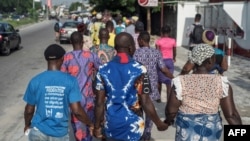Across Nigeria, citizens gathered in parks, street corners and office spaces on Monday to mark the very first National Day of Mourning.
The event, unprecedented in scale, was not officially endorsed by the government.It was led by civil society activists to protest what they described as “the pandemic rise in violent conflicts across Nigeria.”
At noon local time, millions of people held a moment of silence to reflect and mourn with families who have lost relatives to violence, terrorism and crime.
Felix Abrahams Obi, a public health activist in Abuja, said the day has become sadly necessary in Nigeria.
“Because of the frequency of the killings, it seems as if a whole lot of us Nigerians have become a bit numb to the pain," he told VOA. "They’re just seen as numbers, 20 people killed. But the people have names, they have families, they have friends, they have goals, they have visions.”
Elsewhere, observances were planned by Nigerians living in South Africa, Britain and the United States. Social media users shared their experience with hashtags like #Nigeria Mourns and #One Death Too Many.
Africa's most populous country faces a level of insecurity that many citizens say has increased in the past five years.
One of the National Day of Mourning organizers, a youth advocacy group called "Enough is Enough, Nigeria," said more than 3,000 people have been killed this year alone.
Some try to ignore it.“Sometimes I deliberately look away and refuse to think of it…it’s mainly about emotional and mental health,” said an Abuja-based Nigerian citizen who asked to remain anonymous. “I’ve had my share of mourning the last couple of months, lost some close friends and relatives. There’s [only] so much I can take.”
Rising herder-farmer conflict
Violence includes the terrorist group Boko Haram’s war against the government, entering its 10th year. Last Thursday marked 1,500 days since the now-infamous Chibok schoolgirls' abduction. More than 100 of them are still missing.
But there’s also a growing conflict involving farmers and nomadic cattle herders in central Nigeria.Farmers accuse herders of encroaching on their land and killing farmers.The herders say they are being attacked by cattle thieves.On a regular basis, local news outlets report clashes that kill dozens of people.
The herders are believed to be from the Fulani ethnic group.Nigerians often accuse President Muhammadu Buhari of being soft on this issue because is Fulani and comes from a family of cattle raisers.The president has vowed to punish the perpetrators, but few arrests have been made.
The clashes also have a religious angle.Most of the herders are Muslim, and last month a Catholic church in the state of Benue was attacked, allegedly by Fulani cattle herders.Seventeen parishioners and two Nigerian priests were killed.
“It’s been out of control. The most dangerous one is the Fulani herdsmen [issue]. It threatens the existence of Nigeria the way nothing else has ever done,” said Rudolf Okonkwo, a New York-based Nigerian journalist and satirist.
Okonkwo is known for his comedic YouTube series, Dr. Damages, in which he pokes fun at Nigerian current affairs.But when it comes to the recent violence in his native country, he says there is nothing to laugh about.
“There’s nothing funny. I think it’s important that Nigerian people rise up and say enough is enough. I mean they say it, but they don’t put action behind it because most of the time Nigerians stay at home and comment on social media. The government of Nigeria is so far away from the people. If you don’t do anything to make them pay attention to what concerns you, they stay in their cozy places in Abuja and the capitals of states and do what they like.”
Security forces responsible too
Nigerian security forces are also seen as contributing to the violence. International rights groups have used them of using heavy-handed force on unarmed activists like the members of the Biafran secessionist movement .
“The reckless approach to crowd control favored by the security forces when policing peaceful pro-Biafra protests has left more than 150 dead since August 2015, not to mention cases of enforced disappearance and unlawful detention,” said Osai Ojigho, Director of Amnesty International Nigeria.
In 2015, government security agents killed an estimated 300 Shi'ite Muslims when soldiers encountered worshippers at a religious procession in the northern city of Zaria. They arrested and detained the leader of Nigeria’s largest Shi'ite Muslim organization, the Islamic Movement in Nigeria. Since then, Shi'ite Muslims have been conducting street marches in the Nigerian capital of Abuja where many have been brutally beaten.
President Buhari also says he has done well in helping to secure the nation and recently announced his intention to run in elections set for February 2019. Many Nigerians, however, say he has simply failed to protect the people.




